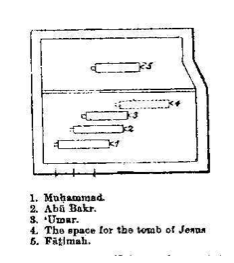It is related that Muhammad prayed that God would not allow his followers to make his tomb an object of idolatrous adoration, and consequently the adoration paid to the tomb at al-Madinah has been condemned by the Wahhabis and other Muslim reformers.
In A.D. 1804, when al-Madinah was taken by the Wahhabis, their chief, Sa’ud, stripped the tomb of all its valuables, and proclaimed that all prayers and exaltations addressed to it were idolatrous. (See Burton’s Pilgrimage, vol. ii; Burckhardt’s Arabia and Wahhabis.)
The garden annexed to the tomb is called ar-Rauzah, which is a title also given by some writers to the tomb itself.
Abu Da’ud relates that al-Qasim the grandson of Abu Bakr came to ‘Ayishah and said, “O Mother, lift up the curtain of the Prophet’s tomb and of his two friend, Abu Bakr and ‘Umar, and she uncovered the graves, which were neither high nor low, but about one span in height, and were covered with red gravel. (Mishkat, book v, ch. vi pt. 2)
Based on Hughes, Dictionary of Islam


 © 2025 All Rights Reserved
© 2025 All Rights Reserved